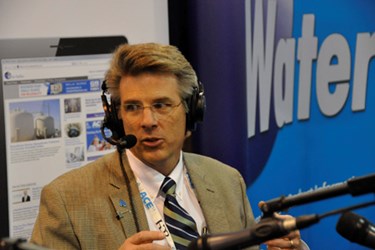AWWA Executive Director Discusses Aging Infrastructure And Drought

David LaFrance, Executive Director of the American Water Works Association (AWWA), discusses the work being done with lawmakers to fund water infrastructure replacement and some of the steps utilities can take when faced with drought.
The following is an excerpt from a Q&A with Water Online Radio. Click on the Radio Player above to hear the full interview.
Water Online Radio: What are the top water issues in the US?
David: There are a lot of them, but I'll simplify it down to two. Nationally, or even internationally, the big issue that we see coast to coast, north to south, is aging infrastructure, and a lot of that infrastructure is buried.
We're concerned, and our members are concerned about making sure that the public values that, and we can get in there and fix those old pipes. A lot of pipes were put into the ground after World War II. In fact, Denver Water, the local utility here, just had a pipe break and when they dug it up, it was built before 1900.
There's a lot of old pipe in the ground that needs to be replaced. That costs money, and when you're in difficult economic times like this, utilities can have difficulty making sure they can generate the revenues to replace all the aging infrastructure.
The second topic, and it's a little more regional, is drought. You see that alot in the arid West, and how do you respond to drought, when you're trying to manage that resource.
Water Online Radio: The more I think about it, the uglier these issues seem. How do you attack the economic piece of the aging infrastructure issue?
David: That's a great question. First, it’s a national and North American problem, but it's got to be handled in the local arena. It's got a broad reach, but it is a local solution. The way AWWA helps is first building awareness.
We've issued a report that talks about the cost for the US. It's going to be a trillion dollars over the next 25 years, and we're also working on some legislation that will create an authority that will make low-cost interest loans to water utilities.
Water Online Radio: Is Washington focused enough on this problem? I mean, a trillion dollars is a significant number. I worry that our elective leaders aren't getting at the focus of the needs. What's your assessment of that?
David: Our elected leaders have a lot that they have to balance, and water is one of those. If we were back five years ago, I'd say it really wasn't much on their radar screen, but it is becoming increasingly so.
We have a Washington, DC office that works very closely with the regulators and the legislators, and every year, we do what we call a fly-in, where our members fly in to DC, we organize them around issues, they make appointments with their legislators, and they visit with them to explain the importance of this issue.
Water Online Radio: Relative to drought, what on earth can we do? We can't make it rain more. I can dance – well, actually, I can't, but what are we going to do about drought?
David: It's funny you should say dancing, because one of the new things we did when we opened up our conference was to have some rain dancers come in and do a rain dance for all of the members.
Water Online Radio: And you didn't recruit me for that?
David: We were looking for you, but I think you were busy here with the radio show.
Here's what we can do. There's about three or four core things that you do in a drought. First, you hope that you have a nice, diversified portfolio of water supplies, and we see water utilities around the world diversifying their sources of supply and their different portfolios of how they're going to supply water.
That's part of why AWWA is all about total water solutions. But the second thing you've got to do is you've got to do some planning. Hopefully you've done your drought planning ahead of time, and then you start to implement that plan. It's very difficult, because you don't know how long a drought is going to last, or how severe it will be, when you start to enter into it.
The third, probably the key thing, is when you're trying to plan out the pace of how much you can dry down your water, you've got to really work with your public, and you've got to engage them actively in making sure that they use water only as they need it. In a drought, candidly, they've got to use less…
Click on the Radio Player above to hear the full interview.
